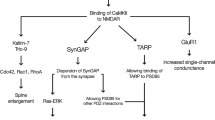Abstract
Among the various molecular events that have been proposed to contribute to the mechanisms of long-term potentiation (LTP), one of the most cited possibilities has been the activation of protein kinase C (PKC). Here we review various aspects of the cellular actions of PKC activationa and inhibition, with special emphasis on the effects of the kinase on synaptic transmission and theN-methyl-D-aspartate (NMDA) and non-NMDA receptor-mediated components of synaptic responses. We discuss the implications of these effects for interpretations of the role of PKC in the mechanisms of LTP induction and maintenance.
Similar content being viewed by others
References
Akers R. F., Lovinger D. M., Colley P. A., Linden D. J., and Routtenberg A. (1986)Science 231, 587–589.
Amador M. and Dani J. A. (1991)Neurosci. Lett. 124, 251–255.
Baraban J. M., Snyder S. H., and Alger B. E. (1985)Proc. Natl. Acad. Sci. USA 82, 2538–2542.
Baskys A., Bernstein N. K., Barolet A. W., and Carlen P. L. (1990)Neurosci. Lett. 112, 76–81.
Bliss T. V. P. and Gardner-Medwin A. R. (1973)J. Physiol. (Lond.) 232, 357–374.
Chavez-Noriega L. E., Halliwell J. V., and Bliss T. V. P. (1990)Exp. Brain Res. 79, 633–641.
Collingridge G. L., Kehl S. J., and McLennan H. (1983)J. Physiol. Lond. 334, 33–46.
Collingridge G. L. and Singer W. (1990)TIPS 11, 290–296.
Davies C. H., Starkey S. J., Pozza M. F., and Collingridge G. L. (1991)Nature 349, 609–611.
Del Cerro S., Larson J., Oliver M. W., and Lynch G. (1990)Brain Res. 530, 91–95.
Denny J. B., Polan-Curtain J., Rodriguez S., Wayner M. J., and Armstrong D. L. (1990)Brain Res. 534, 201–208.
DeRiemer S. A., Strong J. A., Albert K. A., Greengard P., and Kaczmarek L. K. (1985)Nature 313, 313–315.
Doerner D., Abdel-Latif M., Rogers T. B., and Alger B. E. (1990)J. Neurosci. 10, 1699–1706.
Doerner D., Pitler T. A., and Alger, B. E. (1988)J. Neurosci. 8, 4069–4078.
Finch D. M. and Jackson M. B. (1990)Brain Res. 518, 269–273.
Goh J. W. and Pennefather P. S. (1989)Science 244, 980–983.
Grover L. M. and Teyler T. J. (1990)Nature 347, 477–479.
Gustafsson B., Huang Y. Y., and Wigström H. (1988)Neurosci. Lett. 85, 77–81.
Harris E. W., Canong A. H., and Cotman C. W. (1984)Brain Res. 323, 132–137.
Herron C. E., Lester R. A. J., Coan E. J., and Collingridge G. L. (1986)Nature 322, 265–268.
Hu G. Y., Hvalby O., Walaas I., Albert K. A., Skjeklo P., Andersen P., and Greengaard P. (1987)Nature 328, 426–429.
Kaczmarek L. K. (1987)TINS 10, 30–34.
Kauer J. A., Malenka R. C., and Nicoll R. A. (1988)Neuron 1, 911–917.
Larson J. and Lynch G. (1986)Science 232, 985–988.
Larson J. and Lynch G. (1988)Brain Res. 441, 111–118.
Linden D. J. and Routtenberg A. (1989)Brain Res. Rev. 14, 279–296.
Lovinger D. M., Wong K. L., Murakami K., and Routtenberg A. (1987)Brain Res. 436, 177–183.
Lovinger D. M., Colley P. A., Akers R. F., Nelson R. B., and Routtenberg A. (1986)Brain Res. 399, 205–211.
Lynch G. and Baudry M. (1984)Science 224, 1057–1063.
Lynch G., Larson J., Kelso S., Barrionuevo G., and Schottler F. (1983)Nature 305, 719–721.
Lynch M. A., Clements M. P., and Bliss T. V. P. (1989)Neurosci. Lett. 84, 291–296.
MacDonald J. F., Mody I., and Salter M. W. (1989)J. Physiol. (Lond) 414, 17–34.
Madison D. V., Malenka R. C., and Nicoll R. A. (1986)Nature 321, 695–697.
Madison D. V., Malenka R. C., and Nicoll R. A. (1991)Annu. Rev. Neurosci. 14, 379–397.
Malenka R. C. (1991)Neuron 6, 53–60.
Malenka R. C., Ayoub G. S., and Nicoll R. A. (1987)Brain Res. 403, 198–203.
Malenka R. C., Kauer J. A., Perkel D. J., et al. (1989)Nature 340, 554–556.
Malenka R. C., Kauer J. A., Zucker R. J., and Nicoll R. A. (1988)Science 242, 81–84.
Malenka R. C., Kamer J. A., Perkel D. J., Mauk M. D., Kelly P. T., Nicoll R. A., and Wahsam M. N. (1986)J. Neurosci. 6(2), 475–480.
Malenka R. C., Madison D. V., and Nicoll R. A. (1986)Nature 331, 175–177.
Malinow R., Madison D. V., and Tsien R. W. (1988)Nature 335, 820–824.
Malinow R., Schulman H., and Tsien R. W. (1989)Science 245, 862–866.
Muller D., Bittar P., and Boddeke H. (1991) Neurosci. Lett. (in press).
Muller D., Buchs P.-A., Dunant Y., and Lynch G. (1990)Proc. Natl. Acad. Sci. USA 87, 4073–4077.
Muller D., Joly M., and Lynch G. (1988)Science 242, 1694–1697.
Muller D. and Lynch G. (1988)Proc. Natl. Acad. Sci. USA 85, 9346–9350.
Muller D. and Lynch G. (1989)Brain Res. 479, 290–299.
Muller D. and Lynch G. (1990)Synapses, 94–103.
Muller D., Turnbull J., Baudry M., and Lynch G. (1988)Proc. Nat. Acad. Sci. USA 85, 6997–7000.
Nowak L., Bregestoski P., Ascher P., Herbet A., and Prochiantz A. (1984)Nature 307, 462–465.
Pontremoli S., Melloni E., Michetti M., Sacco O., and Salamino F. (1986)J. Biol. Chem. 261, 8309–8313.
Reymann K. G., Davies S. N., Matthies H., Kase H., and Collingridge G. L. (1990)Eur. J. Neurosci. 2, 481–486.
Reymann K. G., Frey U., Jork R., and Matthies H. (1988)Brain Res. 440, 305–314.
Schoepp D. D. and Johnson B. G. (1988)Biochem. Pharmacol. 37, 4299–4305.
Segal M. (1989)Neurosci. Lett. 101, 169–174.
Shapira R., Silberberg S., Ginsburg S., and Rahamimoff R. (1987)Nature 325, 58–60.
Staubli U., Larson J., Thibault O., Baudry M., and Lynch G. (1988)Brain Res. 444, 153–158.
Staubli U. and Lynch G. (1987)Brain Res. 435, 227–234.
Storm J. F. (1987)Neurosci. Lett. 75, 71–74.
Turnbull J., Muller D., Baudry M., and Lynch G. (1988)Soc. Neurosci. Asbt. 13, 1315.
Williams J. H. and Bliss T. V. P. (1988)Neurosci. Lett. 88, 81–85.
Zucker R. S. (1973)J. Physiol. (Lond.) 229, 787–810.
Zurgil N. and Zisapel N. (1985)FEBS Lett. 185, 257–263.
Author information
Authors and Affiliations
Rights and permissions
About this article
Cite this article
Muller, D., Buchs, PA., Stoppini, L. et al. Long-term potentiation, protein kinase C, and glutamate receptors. Mol Neurobiol 5, 277–288 (1991). https://doi.org/10.1007/BF02935551
Issue Date:
DOI: https://doi.org/10.1007/BF02935551




